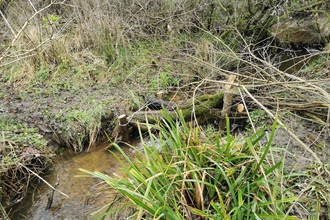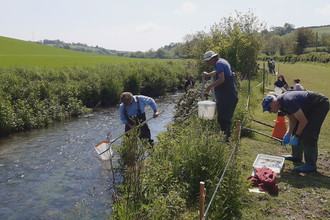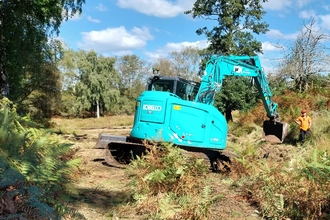Water for Wildlife
Dorset's wetlands and waterways are in crisis
Without water, wildlife and people cannot survive. But less than 15% of Dorset's rivers are in good condition, and 90% of the UK’s wetlands have disappeared in the last 100 years. Our remaining rivers and wetlands are under constant threat from climate change and pollution.
We must act now to protect these powerful habitats. Wetlands are home to a staggering 40% of the planet's wildlife and plant life, all while storing carbon, improving the water quality in downstream rivers, and reducing flooding. Donate to the Water for Wildlife appeal and you’ll be enabling work to create wetlands not just for the benefits to us humans, but for lapwing, water vole, grass snake, frogs and many more wildlife species in Dorset.

£50
could help build a leaky dam, great for slowing and spreading the flow of water across the land.
£100
could pay for a set of riverfly monitoring kits to enable wetland species surveys.
£300
could fund half a day of an excavation operator’s time, filling old ditches to help slow the flow of water through the site.How your support will help
River restoration
By removing artificial drainage such as ditches and culverts, we can restore the natural paths of rivers. This transformative work creates a mosaic of habitats, from the wetlands formed around the river's headwaters, to the flowing streams and rivers that host fish, invertebrates and many more riverbank species like water vole. We've already seen how effective this work can be at Wild Woodbury where the restored headwaters of the River Sherford now host an adundance of freshwater and wetland species. Now, we’re continuing this vital work for wildlife at Lyscombe, where more river restoration is underway.
Wetland habitat creation
With your help, we can create more wetland habitat across Dorset. We recently acquired land next to our Tadnoll & Winfrith Heath nature reserve, brimming with wildlife potential. This site offers the perfect conditions to reintroduce wet habitats that support species like lapwing, grass snake, dragonfly, and many more. With your support, we can enlist expert advice and essential contractors to help us rewet the land and filter water to improve the quality and reduce nutrient pollution reaching Poole Harbour.
Creating ponds for wildlife
Ponds play an important role in supporting some of Dorset’s rarest freshwater species. The great crested newt, for example, relies on clean, well-managed ponds to breed and thrive. At Kingcombe National Nature Reserve, we’ve seen firsthand how restoring ponds can bring aquatic habitats back to life, supporting frogs, dragonflies, water beetles, and more.
By creating and restoring more ponds across Dorset, we can give wildlife more of the safe, healthy spaces they need to survive.
Improving water quality
Wetland habitat is vital for a number of species, but its benefits stretch far beyond this. Wetlands act as natural filters, removing harmful substances including metals, sediment runoff and nitrates from rivers and streams. Excess nitrates, entering watercourses from sewage and agricultural fertilisers, are responsible for algal mats which choke Poole Harbour, excluding light and oxygen and making it difficult for aquatic wildlife to survive.
Nature reserve case studies
Wild Woodbury
By removing artificial drainage, the Sherford River headwaters have been restored at Wild Woodbury, near Bere Regis. This has allowed water to flow freely across the landscape once more. The river restoration has transformed the area, improving water quality, reducing pollution, and creating a dynamic wetland habitat.
The results have been dramatic: Wild Woodbury is now a thriving habitat for lapwing, while amphibians flourish and dragonflies dart across newly formed pools. This is a living example of how river restoration can breathe life back into the land. By working with natural processes, we can build a healthier, more resilient Dorset where wildlife can flourish.
Tadnoll & Winfrith Heath
By infilling artificial ditches and installing leaky dams, we’ll slow the flow of water across the land, helping to raise water levels and rewet the new section of the site. This will create a more natural, dynamic wetland landscape, perfect for boosting biodiversity and supporting a wide range of species.
Water vole and grass snake will thrive in the damp vegetation, and rare plants like marsh clubmoss will benefit from the perfect growing conditions. This project is a vital step in expanding Dorset’s wetland habitats and building resilience against climate change, while giving wildlife the space it needs to flourish.
Lyscombe
We’re restoring the headwaters of the Little Piddle, bringing life back to this river on our Lyscombe nature reserve near Dorchester. By slowing water's flow and reconnecting the river with its natural floodplain, we’ll create a rich mosaic of wetland habitats that support a wide range of wildlife.
Removing old culverts and dismantling a disused livestock yard built over the stream will allow the river to return to its natural course. This rewetting work will encourage the growth of wetland plants, improve water quality, and provide vital breeding and feeding grounds for amphibians, insects, and birds.
Kingcombe National Nature Reserve
At Kingcombe National Nature Reserve near Maiden Newton, we’re creating and restoring ponds that will breathe new life into the landscape. Ponds are essential for boosting biodiversity as each pond becomes a miniature ecosystem, supporting wildlife and rare flora that depend on clean, calm water to thrive.
As we expand wetland habitats across the nature reserve, we’re helping wildlife flourish while building resilience against climate change. With your support, this work can continue and expand across the landscape.


